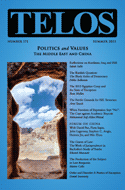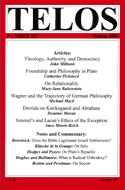By Telos Press · Monday, August 3, 2015 Telos Press Publishing is pleased to announce that Ernst Jünger’s Eumeswil is now available for pre-order. The book will be released on September 1, 2015. Pre-order your copy today, and we will ship it as soon as it becomes available.
Continue reading →
By Matteo Calla · Thursday, July 30, 2015  This article places Benjamin’s late work in dialogue with recent attempts in media theory and structuralism to think the subject and historical contingency together. It argues their apparent incompatibility is reflected in Benjamin’s writing in the form of a recurrent contradiction between historical materialism and transhistorical theology. Through a reconstruction of the theorist’s historicization of an earlier theological theory of the fall of language in his Marxian-inflected work of the 1930’s, it claims that Benjamin initiates a historicist reconceptualization of the impasse of the Kantian subject onto being as the product of a particular field of mediation arising with mass modernity. Yet following the rejection of his nascent version of the Arcades Project by Adorno and the Marxist Institute for Social Research in 1938, theology returns as an attempt to reconceive of an aesthetic-formal break with this impasse. Benjamin’s late theorization of his materialist historiography thus represents a dialectical attempt to think materialism and theology, history and being together, with the aim of mediating not only distraction, but a revolutionary destruction of the subject and the historical order producing it. This article places Benjamin’s late work in dialogue with recent attempts in media theory and structuralism to think the subject and historical contingency together. It argues their apparent incompatibility is reflected in Benjamin’s writing in the form of a recurrent contradiction between historical materialism and transhistorical theology. Through a reconstruction of the theorist’s historicization of an earlier theological theory of the fall of language in his Marxian-inflected work of the 1930’s, it claims that Benjamin initiates a historicist reconceptualization of the impasse of the Kantian subject onto being as the product of a particular field of mediation arising with mass modernity. Yet following the rejection of his nascent version of the Arcades Project by Adorno and the Marxist Institute for Social Research in 1938, theology returns as an attempt to reconceive of an aesthetic-formal break with this impasse. Benjamin’s late theorization of his materialist historiography thus represents a dialectical attempt to think materialism and theology, history and being together, with the aim of mediating not only distraction, but a revolutionary destruction of the subject and the historical order producing it.
Continue reading →
By Kyle Nicholas · Tuesday, July 21, 2015  In his article “The Last of the Last: Theology, Authority, and Democracy,” from Telos 123 (Spring 2002), John Milbank argues that theology’s proper role is within the Church extended through time and space, rather than as “‘a public discourse’ answerable to the critical norms and liberal values.” Yet his claim does not come without qualification. Many aspects of theological inquiry that were once held together have splintered since 1300 CE: faith and reason, scripture and tradition, and theology under ecclesial authority, in particular. Here the Church is actually more to blame, both Protestantism and Post-Tridentine Catholicism, than some (fictional) increasingly enlightened and liberated society. In his article “The Last of the Last: Theology, Authority, and Democracy,” from Telos 123 (Spring 2002), John Milbank argues that theology’s proper role is within the Church extended through time and space, rather than as “‘a public discourse’ answerable to the critical norms and liberal values.” Yet his claim does not come without qualification. Many aspects of theological inquiry that were once held together have splintered since 1300 CE: faith and reason, scripture and tradition, and theology under ecclesial authority, in particular. Here the Church is actually more to blame, both Protestantism and Post-Tridentine Catholicism, than some (fictional) increasingly enlightened and liberated society.
Continue reading →
By Telos Press · Sunday, July 19, 2015 Ben Agger passed away unexpectedly on Tuesday, July 14, 2015, after experiencing a brief illness. Part of the larger Telos community, as an advocate, reader, and supporter since the 1960s and 1970s in Toronto, Ben was a native of Oregon who became a undergraduate and graduate student at York University before receiving his PhD in Political Economy at the University of Toronto in 1976. After teaching at Bishop’s University in Quebec and the University of Waterloo in Ontario, he returned to the United States to work from 1981 to 1994 at SUNY-Buffalo. He then moved to the University of Texas-Arlington to be the Dean of the College of Liberal Arts and Professor of Sociology until 1998. Since that time, he served as Professor of Sociology and Humanities as well as the Director of the Center for Theory.
Ben Agger was a truly a critical social theorist, a much admired teacher, a prolific author, and one of Telos‘s best friends. He will be missed.
Continue reading →
By Sabah Salih · Wednesday, July 15, 2015
 The recent dramatic rise of Kurdistan as a major power player in the Middle East could not have happened without America’s 2003 regime change in Iraq. The change also resulted in a dramatic rise in the standard of living and in the way people live their lives and think about themselves and their world. Contrary to the common view in the West, the intervention did not break up a unified Iraq; it rather sped up the unraveling of colonialism’s post–World War I handiwork, which stupidly imposed the tyranny of a minority on the majority. Saddam Hussein laid the groundwork for ISIS’s emergence with his creation of Saddam’s Fidayeen paramilitary force following the first Gulf War. The recent dramatic rise of Kurdistan as a major power player in the Middle East could not have happened without America’s 2003 regime change in Iraq. The change also resulted in a dramatic rise in the standard of living and in the way people live their lives and think about themselves and their world. Contrary to the common view in the West, the intervention did not break up a unified Iraq; it rather sped up the unraveling of colonialism’s post–World War I handiwork, which stupidly imposed the tyranny of a minority on the majority. Saddam Hussein laid the groundwork for ISIS’s emergence with his creation of Saddam’s Fidayeen paramilitary force following the first Gulf War.
Continue reading →
By Lukas Szrot · Tuesday, July 7, 2015 The aftermath of the War on Terror rages on despite bipartisan assurances that “major combat operations are over” and that “the war is coming to a close.” This ongoing conflict has produced, and continues to produce, prodigious human casualties and economic hemorrhaging. Tim Luke’s words regarding September 11, 2001, are in many ways as timely today as they were nearly fourteen years ago.
Continue reading →
|
|
 This article places Benjamin’s late work in dialogue with recent attempts in media theory and structuralism to think the subject and historical contingency together. It argues their apparent incompatibility is reflected in Benjamin’s writing in the form of a recurrent contradiction between historical materialism and transhistorical theology. Through a reconstruction of the theorist’s historicization of an earlier theological theory of the fall of language in his Marxian-inflected work of the 1930’s, it claims that Benjamin initiates a historicist reconceptualization of the impasse of the Kantian subject onto being as the product of a particular field of mediation arising with mass modernity. Yet following the rejection of his nascent version of the Arcades Project by Adorno and the Marxist Institute for Social Research in 1938, theology returns as an attempt to reconceive of an aesthetic-formal break with this impasse. Benjamin’s late theorization of his materialist historiography thus represents a dialectical attempt to think materialism and theology, history and being together, with the aim of mediating not only distraction, but a revolutionary destruction of the subject and the historical order producing it.
This article places Benjamin’s late work in dialogue with recent attempts in media theory and structuralism to think the subject and historical contingency together. It argues their apparent incompatibility is reflected in Benjamin’s writing in the form of a recurrent contradiction between historical materialism and transhistorical theology. Through a reconstruction of the theorist’s historicization of an earlier theological theory of the fall of language in his Marxian-inflected work of the 1930’s, it claims that Benjamin initiates a historicist reconceptualization of the impasse of the Kantian subject onto being as the product of a particular field of mediation arising with mass modernity. Yet following the rejection of his nascent version of the Arcades Project by Adorno and the Marxist Institute for Social Research in 1938, theology returns as an attempt to reconceive of an aesthetic-formal break with this impasse. Benjamin’s late theorization of his materialist historiography thus represents a dialectical attempt to think materialism and theology, history and being together, with the aim of mediating not only distraction, but a revolutionary destruction of the subject and the historical order producing it.  In his article “The Last of the Last: Theology, Authority, and Democracy,” from Telos 123 (Spring 2002), John Milbank argues that theology’s proper role is within the Church extended through time and space, rather than as “‘a public discourse’ answerable to the critical norms and liberal values.” Yet his claim does not come without qualification. Many aspects of theological inquiry that were once held together have splintered since 1300 CE: faith and reason, scripture and tradition, and theology under ecclesial authority, in particular. Here the Church is actually more to blame, both Protestantism and Post-Tridentine Catholicism, than some (fictional) increasingly enlightened and liberated society.
In his article “The Last of the Last: Theology, Authority, and Democracy,” from Telos 123 (Spring 2002), John Milbank argues that theology’s proper role is within the Church extended through time and space, rather than as “‘a public discourse’ answerable to the critical norms and liberal values.” Yet his claim does not come without qualification. Many aspects of theological inquiry that were once held together have splintered since 1300 CE: faith and reason, scripture and tradition, and theology under ecclesial authority, in particular. Here the Church is actually more to blame, both Protestantism and Post-Tridentine Catholicism, than some (fictional) increasingly enlightened and liberated society. 

